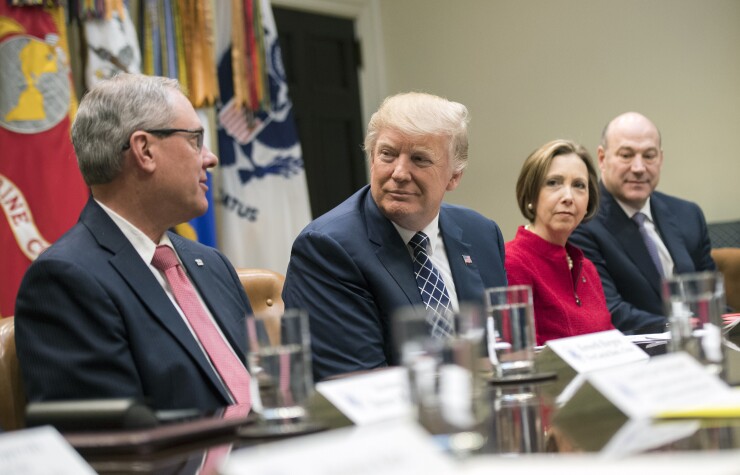WASHINGTON — President Trump met with community bankers on Thursday to highlight executive actions he has taken to provide regulatory relief to the industry and promote job growth.
Trump has signed executive orders that put a pause on new regulations, call for eliminating two rules for every one new one written and ordered Treasury Secretary Steven Mnuchin to report back with a strategy to improve financial regulation. The independent regulators do not have to explicitly comply with the executive orders, but have generally volunteered to do so.
Trump used the meeting to praise community banks as well as pledge relief.
Small banks "play a vital role in helping create jobs by providing approximately half of all loans to small businesses," Trump said, according to a pool report. "Community banks are the backbone of small business in America."

Trump met in the Roosevelt Room at the White House with nine community bankers, as well as Rob Nichols, the head of the American Bankers Association, and Camden Fine, president of the Independent Community Bankers of America. Mnuchin and Gary Cohn, the director of the National Economic Council, also attended the meeting.
Trump said the executive orders were "very powerful" and are already "taking a lot of the regulation away."
But it's not clear that is the case. The executive orders have been general in nature, and do not appear to have stopped the agencies from promulgating rules already in the pipeline. The executive order that requires agencies to cut two regs for every new one is easily maneuvered around, financial analysts have said.
Still, Trump said they will have an impact.
"You'll be able to loan," Trump told the group. "You'll be able to be safe. You'll be able to provide the jobs that we want and also create great businesses."
Overall, bankers
Republican lawmakers praised Trump for meeting with bankers, saying it was a sign of how committed the president is to relief.
“It is encouraging to have a president who is listening to the concerns of community bankers who have been buried under an avalanche of burdensome regulations as a result of Dodd-Frank,” Rep. Jeb Hensarling, chairman of the House Financial Services Committee, said in a statement. “We are losing, on average, a community financial institution a day because of the sheer size, weight and complexity of these regulations that prevent community banks from serving their customers.”
However, consumer groups are pushing back against the idea that regulations are strangling small banks.
““Hard data on bank earnings and lending should lay to rest any notion that financial regulations are holding back the American economy, or getting in the way of American banks making money," Marcus Stanley, policy director at Americans for Financial Reform, said last week.
He pointed at a Federal Deposit Insurance Corp. report that showed bank earnings reached record levels during 2016, while loan balances grew 5.3%.
The bankers at the meeting were: Timothy Zimmerman, CEO of the $486 million-asset Standard Bank in Murraysville, Pa.; Luanne Cundiff, CEO of the $363 million-asset First State Bank of St. Charles in Missouri; Scott Heitkamp, CEO of the $214 million-asset ValueBank Texas in Corpus Christi; Leslie R. Andersen, CEO of the $116 million-asset Bank of Bennington in Nebraska; Kenneth L. Burges Jr., chairman of the $956 million-asset FirstCapital Bank of Texas in Midland; Rebeca Romero Rainey, CEO of the $222 million-asset Centinel Bank of Taos in New Mexico; Laura Lee Stewart, CEO of the $588 million-asset Sound Community Bank and Sound Financial Bancorp in Seattle; and Jeffrey M. Szyperski, vice chairman of the $717 million-asset Chesapeake Financial Services Inc. in Kilmarnock, Va.
Dorothy Savarese, CEO of the $3 billion-asset Cape Cod Five Cents Savings Bank in Harwich Port, Mass., sat between Trump and Cohn. Saverese chairs the ABA's board of directors.





